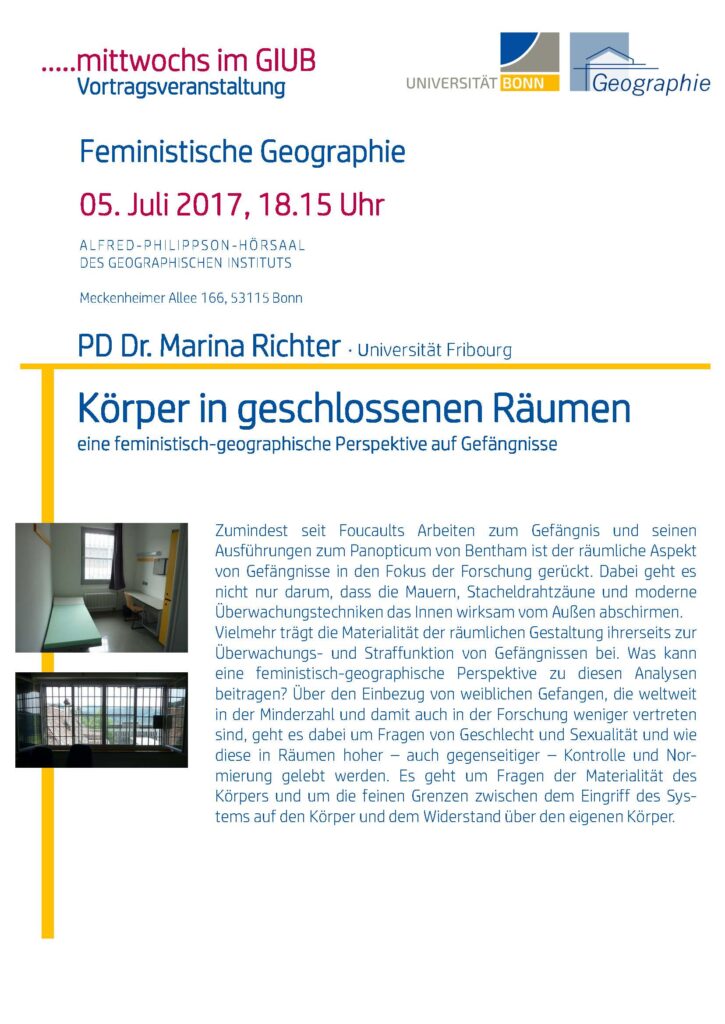Prison Research Group member Ueli Hostettler acts as member of the Editorial Board
- Journal Link: Incarceration: An international journal of imprisonment, detention and coercive confinement

University of Bern | Institute for Penal Law and Criminology
Prison Research Group member Ueli Hostettler acts as member of the Editorial Board

Dieser NZZ Format Film beleuchtet Fragen, die sich durch die immer älter
werdende Gefangenenpopulation im Kontext des zunehmenden
Sicherheitsbedürfnis der Gesellschaft stellen. Insbesondere geht es um
die Frage, ob auch Schwerverbrecher ein Recht auf Sterben in Würde
haben? Die Prison Research Group war an diesem Filmprojekt beteiligt.
Sendezeiten: Do, 30.11.2017 23:00 auf SRF 1 / So, 3.12.2017 16:50 SRF Info / Mo, 4.12.2017 12:10 SFR Info
Link zum Film
Link zum Buch „Lebensende im Justizvollzug. Gefangene, Anstalten, Behörde“
Die ReferentInnen:
Julian Burkhalter ist Anwalt von Igor L. .
David Mühlemann ist Jurist bei humanrights.ch.
Marina Richter ist Mitglied der Prison Research Group, welche
am Institut für Strafrecht und Kriminologie der Universität Bern
angesiedelt ist.
Bereits von 2007 bis 2010 hat die PRG damals im Auftrag der Kantons Bern und des Strafvollzugskonkordats der Nordwest- und Innerschweiz den Aufbau der Arbeitsagogik in Witzwil evaluiert.

Geographisches Institut, Universität Bonn (GIUB). Vortragsreihe: …mittwochs am GIUB
Vortrag von Marina Richter
Earlier last month, Anna Isenhardt has passed the final exams and obtained the degree of a Dra. phil.
at the University of Fribourg for her thesis entitled „Die Bedeutung
des subjektiven Sicherheitsgefühls und des Erlebens von Gewalt für das
Wohlbefinden des Personals im Schweizerischen Justizvollzug“.
Also Charlotte Gisler has passed her final exams in order to obtain a MA from the same university.
This workshop has been cancelled due to little interest the CFP has received. A new attempt will probably be launched during the next EASA meeting in 2018.
“Exploring conceptual and epistemological approaches to spaces of confinement”University of Bern, Switzerland 20th/21th July 2017
Confinement is today exercised in a diversity of contexts and institutions. Penal institutions, immigration detention centres, asylums, retirement homes, psychiatric institutions, personal homes for individuals under house arrest, electronic monitoring (and associated curfew) are but a few examples of the variety of shapes that confinement may take.
The first workshop of the EASA “Anthropology of Confinement Network” aims to provide space for a thorough conceptual and epistemological discussion of confinement and to foster in-depth discussion of the different conceptual frames that are relevant to the study of confinement. Additionally, a keynote speech will be provided by Manuela Cunha, senior research fellow at Centre for Research in Anthropology (Universidade do Minho, CRIA-UMinho, Portugal).
We are particularly interested in papers focusing on:
– Institutional power, penal policies and practices
– Materiality and architecture of institutions and contexts of confinement
– Experiences and everyday practices of confinement
If you are interested in our panel proposal, please send an abstract of approx. 200-250 words to irene.marti@krim.unibe.ch until 20 April 2017. Feel free to contact us for further information.
Convenors:
Ueli Hostettler | Institute for Penal Law and Criminology, University of Bern, Switzerland | ueli.hostettler@krim.unibe.ch
Irene Marti | Institute for Penal Law and Criminology, University of Bern, Switzerland | irene.marti@krim.unibe.ch
We expect that we will be able to reimburse travel expenses for participants who present their research and to provide free lodging for two nights at Bern. Further details will follow as soon as possible.
Der Bundesrat hat Stellung genommen zur Interpellation von Frau Ständerätin Liliane Maury Pasquier (16.3736) „Für ein menschenwürdiges Lebensende im Gefängnis und ausserhalb des Gefängnis“
Sowohl die Interpellation wie auch die Stellungnahme machen einen direkten Bezug zur Studie „Lebensende im Gefängnis“, die im Rahmen des NFP67 von der Prison Research Group in Zusammenarbeit mit der Universität Freiburg durchgeführt würde.
Link zur Interpellation
Link zum Schlussbericht der Studie
Link zum Projekt